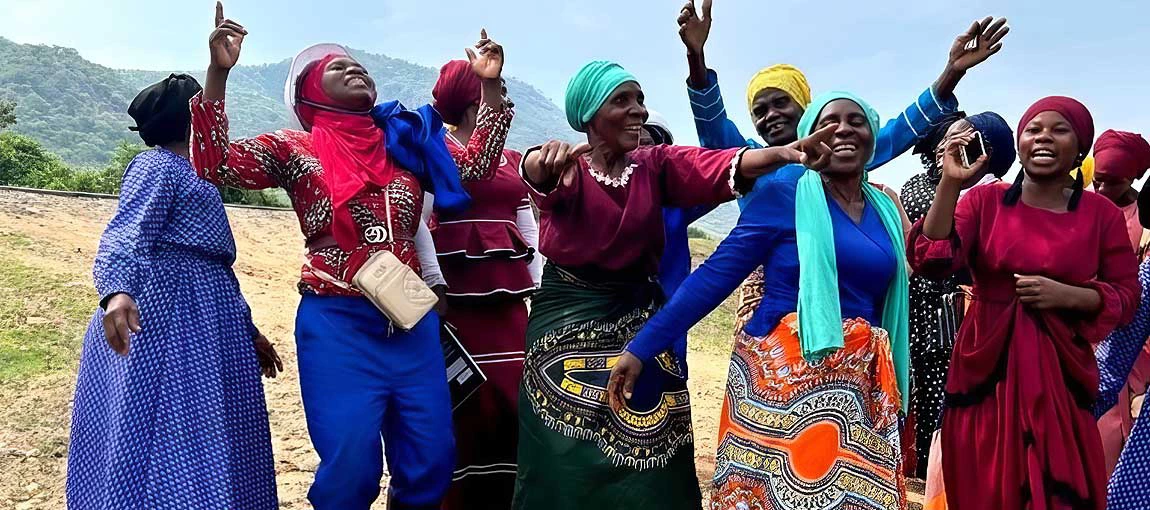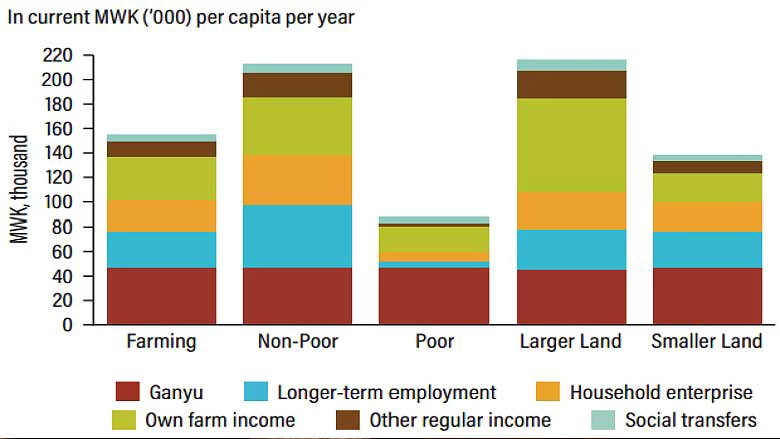 Women-led horticultural producers cooperative in Mangochi, Malawi. Photo: Dipti Thapa
Women-led horticultural producers cooperative in Mangochi, Malawi. Photo: Dipti Thapa
At first sight, Madalitso Gama* appears to be the quintessential Malawian farmer, living with her family of five in a simple brick house in a small, off-grid village, of which many thousands are sprinkled across the hills and plains of Malawi. She and her family have been farming roughly one football pitch worth of land, growing maize, Malawi’s main staple, and sometimes groundnuts or beans on the side. However, you would be mistaken to assume that’s the end of the story. In fact, Madalitso is part of a vibrant women-led cooperative, supplying fresh tomatoes and peppers to hotels and lodges in the Mangochi lakeshore areas. Across Malawi, the Malawi Agricultural Commercialization and Resilience Enhancement (AGCOM) Project has been actively investing in these women change-makers, empowering them to defy the odds, collectively lead community enterprises, and accelerate progress in transforming their local food systems.
The agri-food sector, contributing 22% to Malawi's GDP, 64% of the labor force, and 80% of export earnings, is the backbone of the nation's economy. However, the stark reality is that the vast majority of rural Malawians like Madalitso are simply unable to meet their needs through farming their own lands alone. 80% of households engage in farming, but less than 20% of a typical farming household’s total income is generated from the harvest off their own fields. In other words, rural Malawian households have to turn to activities outside subsistence agriculture to escape poverty. They do this through a range of diversified livelihood strategies, as the recent Malawi Economic Monitor shows.

Amongst this contingent, there is a small but growing share of entrepreneurial smallholders such as Madalitso, that are now joining forces to form Productive Alliances, through which they can collectively pursue market opportunities. This is happening at local levels, particularly where farmers have better access to land and irrigation and are closer to urban markets and trade routes. This strategy has sparked a transformation in rural markets through a simple yet powerful downstream effect: productive farmers who successfully market their produce increase their incomes and create increased demand for products and services. This, in turn, leads to more money circulating in the rural economy. In many communities, this has changed their focus of effort from low-productivity and subsistence-oriented to high-productivity and commercially-oriented agriculture.
The World Bank’s support for agricultural commercialization leverages this exciting rural economic transformation currently underway in Malawi. The AGCOM Project, anchored by the Productive Alliance model, has financed 390 alliances with a total investment of $39 million, directly benefiting 75,000 farmers. Smallholder farmers have organized themselves into groups and cooperatives, mobilizing their own resources to the tune of $4 million, enhancing ownership and sustainability. These farmers have been empowered through matching grants, last-mile infrastructure, and land tenure support, and linked with domestic and regional markets in around 30 value chains across the country. Notably, 57% of beneficiaries are women, showcasing the pivotal role of women as leaders in their community in driving positive changes in agricultural productivity and income generation.
Despite these successes, challenges persist. The vast majority of Malawian households predominantly engage in short-term, seasonal activities, while farming on the side for consumption by their own households. Furthermore, a combination of chronic policy failures and exogenous shocks such as the impending effects of El Nino continue to put pressure on the country’s already fragile agri-food system.
In the face of such challenges, targeted interventions in the agri-food sector are crucial to foster growth and resilience in the country:
- Cash transfers support rural Malawians’ transition from subsistence farming to non-farming livelihoods while stimulating rural markets.
- Climate-smart public work programs offer opportunities when short-term employment is scarce, enhancing resilience against the impacts of climate change.
Meanwhile, commercializing smallholders like Madalitso requires targeted interventions such as skills development and improved access to markets to help unlock more economic opportunities. Fostering commercially successful smallholders while creating both on-and off-farm employment opportunities, as outlined above, are prerequisites to transformative change in the sector.
Recognizing the need for sustained progress, the $265 million Malawi Food Systems Resilience Program (FSRP) has recently been launched as a means of enhancing national and regional food systems resilience. Building on the many successful interventions of AGCOM, the Malawi FSRP aims to increase the commercialization of primary and value-added agricultural products and support climate-smart farming practices, including through investments in research, extension, and infrastructure, and by building the capacity of pivotal public institutions. In these efforts, the project aims to create 560 new Productive Alliances, and cover an additional 130,000 direct beneficiaries. With its holistic approach, the project is poised to catalyze agri-food sector growth, job creation, and resilience, paving the way for rural economic transformation.
Madalitso and farmers like her represent the changing face of Malawi's agricultural landscape, uniquely positioned to be an engine of local economic growth: investing in women like her is the key to accelerating sustainable progress. As the nation moves towards the realization of the government’s Malawi Vision 2063, commercializing smallholders like Madalitso need to be at the forefront of policies and strategic programs - such as those highlighted in the most recent Malawi Country Economic Memorandum - that seek to foster a resilient and commercially vibrant agri-food sector.
*The name has been changed to protect the privacy of the individual.



Join the Conversation